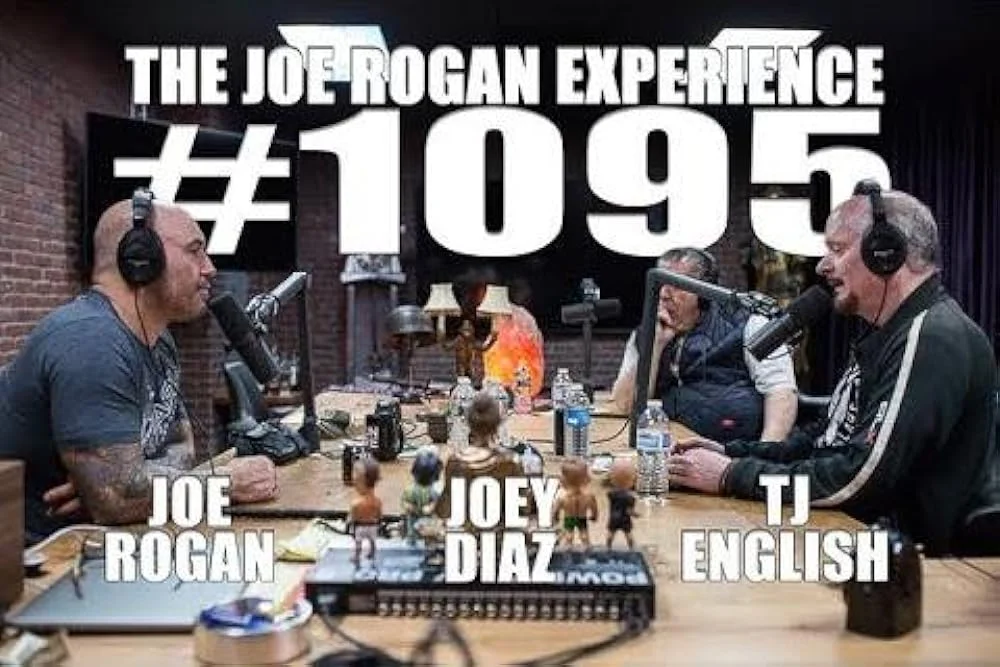
T.J. English & Joey Diaz
T.J. English is a renowned American author and journalist known for his gripping works on organized crime, true crime, and the complex web of the underworld. Born in 1957, his extensive body of work includes bestsellers like "The Westies," "Havana Nocturne," and "Whitey's Payback." With a background in investigative journalism, English has delved deep into the criminal underworld, offering readers unparalleled insights into the lives of mobsters and the gritty realities of their world. Joey Diaz, on the other hand, is a dynamic and comedic force in the entertainment industry. Born in 1963, Joey Diaz, often referred to as "Uncle Joey," is a Cuban-American stand-up comedian, actor, and podcast host. His no-holds-barred comedic style and larger-than-life personality have earned him a devoted following. Known for his appearances on popular podcasts and television shows, Joey Diaz brings laughter to audiences around the world with his unique blend of humor and personal anecdotes.
The Joe Rogan Experience (JRE) #1095: A Glimpse into Organized Crime and Cuban-American History
In episode #1095 of the Joe Rogan Experience, Joe Rogan hosts T.J. English and Joey Diaz, delving into the intricate world of organized crime and its ties with Cuban-American history. English, an author known for his works on mobsters in New York City, discusses his new book “The Corporation,” which explores Cuban organized criminals. Diaz, with his personal connections to New Jersey and knowledge of people in English’s book, brings a unique perspective to the conversation.
The Intricacies of Organized Crime
The episode begins with a focus on English’s book, “The Corporation.” This book narrates the story of Cuban-American organized crime, spearheaded by mobster Jose Miguel Battle. Battle, a noteworthy figure in Cuban-American circles, played a significant role in the Bay of Pigs invasion and later established a criminal network focused primarily on the illegal lottery.
The Cultural and Political Context
The conversation shifts to the cultural and political dimensions of organized crime. English and Diaz discuss the complex relationship between criminal activities, political motivations, and cultural heritage. This includes a deep dive into the history of Cuban immigration to the U.S., the role of the Bay of Pigs invasion, and the resulting anti-Castro sentiment among Cuban exiles.
The Joe Rogan Experience (JRE) #1095: Exploring the Darker Facets of Organized Crime and Cultural Heritage
Continuing with episode #1095 of the Joe Rogan Experience, the discussion dives deeper into the complex world of organized crime, emphasizing its entanglement with politics and the media. The guests highlight how the criminal underworld’s activities often go unreported or misunderstood, leaving a significant portion of history obscured from public knowledge.
Political Intrigue and the Role of Organized Crime
The conversation further explores the intricate relationship between political machinations and organized crime, particularly focusing on the anti-Castro movement and the U.S. government’s alleged complicity in allowing certain criminal enterprises to flourish. This segment paints a vivid picture of the interplay between political agendas and criminal activities.
Cultural Identity and Organized Crime
A significant part of this podcast section revolves around Cuban culture and its influence on organized crime. The guests discuss how cultural elements, such as Santería (an Afro-Cuban religion), play a role in the operations and beliefs of criminal organizations. This deep cultural connection provides an essential backdrop to understanding the nature and motivations behind these criminal networks.
The Joe Rogan Experience (JRE) #1095: Unveiling the Complexities of Cuban Organized Crime
In the concluding third of episode #1095 of the Joe Rogan Experience, the conversation becomes increasingly personal and reflective. Joey Diaz shares his emotional reactions to T.J. English’s book “The Corporation,” which uncovers layers of Cuban-American crime history. Diaz’s connections to many individuals mentioned in the book provide a poignant perspective on the impact of organized crime on personal and community lives.
The Personal Stories Behind the Crime
The discussion delves into specific stories of individuals involved in Cuban organized crime. Diaz recounts personal anecdotes, including his connections to some of the key figures in English’s book. These stories illustrate the deep and often tragic entanglement of individuals and families in the criminal underworld, highlighting the human side of a history often dominated by notorious figures and violent acts.
The Role of Culture and Belief in Organized Crime
The episode also touches on the cultural aspects of Cuban organized crime, particularly the influence of Afro-Cuban religions like Santería. Diaz and English discuss how these spiritual beliefs intertwine with the practices and ethos of criminal organizations, revealing a complex web of cultural, religious, and criminal elements.
Conclusion
This final segment of the podcast offers a powerful and intimate look into the world of Cuban-American organized crime. Through personal stories and cultural insights, Diaz and English provide a multifaceted view of a topic often shrouded in mystery and stereotype. The episode serves as a testament to the intricate and often hidden narratives that lie within historical and contemporary organized crime.
